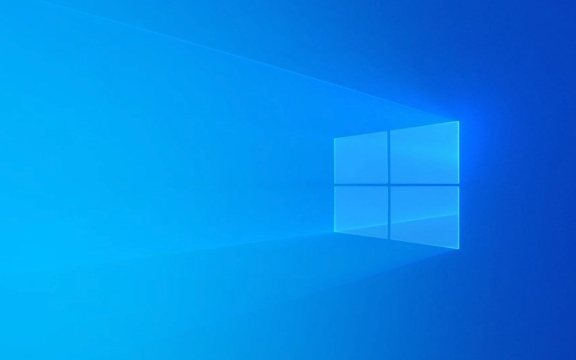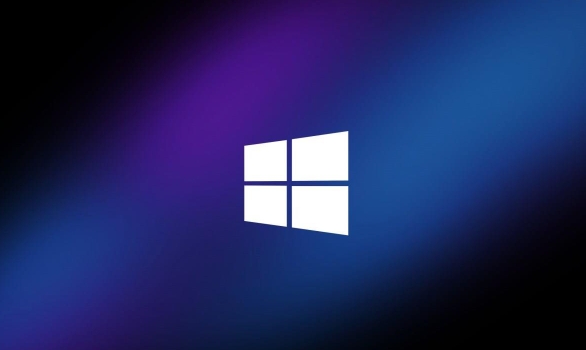To fix Windows 10 shutdown hanging issues, first disable Fast Startup and update or roll back drivers, as these are the most common causes. 1. Close unresponsive apps via Task Manager before shutting down. 2. Disable Fast Startup through Power Options. 3. Update or roll back problematic drivers in Device Manager. 4. Run the built-in Power Troubleshooter. 5. Install pending Windows Updates. 6. Scan for system file corruption using sfc /scannow and DISM commands. 7. Check Event Viewer logs for error clues. 8. Optionally, set non-essential services like Windows Search or Print Spooler to Manual startup. Most issues are resolved with these steps, but if the problem persists, perform a clean boot or repair install of Windows 10.

Windows 10 not shutting down and hanging is a common issue that many users face. It usually happens due to background processes, driver conflicts, or system settings preventing the OS from closing properly. Here’s how to troubleshoot and fix it effectively.

1. Check for Stuck or Unresponsive Apps
Sometimes, a program that’s not responding can stop Windows from shutting down.
- Before shutting down, close all open applications manually.
- Press Ctrl Shift Esc to open Task Manager.
- Look under the Processes tab for any app using high CPU or marked as "Not Responding."
- End those tasks before initiating shutdown.
Tip: Some apps (like OneDrive, Adobe, or updaters) run in the background even when minimized. Make sure they’re fully closed.

2. Disable Fast Startup
Fast Startup is a feature meant to speed up boot time, but it can interfere with proper shutdowns.
Steps to disable:

- Press Win X → Power Options.
- Click Choose what the power buttons do.
- Click Change settings that are currently unavailable (admin rights needed).
- Uncheck Turn on fast startup (recommended).
- Click Save changes.
After disabling, test a full shutdown to see if the issue persists.
3. Update or Roll Back Drivers
Outdated or faulty drivers—especially for storage, chipset, or GPU—can cause shutdown hangs.
- Press Win X → Device Manager.
- Look for any devices with a yellow warning icon.
- Expand Disk drives, Display adapters, and System devices.
- Right-click each → Update driver.
- If the issue started recently, try Roll Back Driver if available.
Alternatively, visit your PC manufacturer’s website to download the latest drivers.
4. Run Power Troubleshooter
Windows includes a built-in tool to detect power-related issues.
- Go to Settings → Update & Security → Troubleshoot.
- Select Additional troubleshooters.
- Run the Power troubleshooter.
- Apply any recommended fixes.
This can automatically detect issues like misconfigured power plans or system delays.
5. Check for Windows Updates
Microsoft often releases patches for known bugs affecting shutdown.
- Go to Settings → Update & Security → Windows Update.
- Click Check for updates and install any pending ones.
- Restart and test shutdown again.
6. Scan for System File Corruption
Corrupted system files can cause unexpected behavior.
Open Command Prompt as admin:
- Press Win X → Command Prompt (Admin) or Windows Terminal (Admin).
- Run:
sfc /scannow
- After it finishes, run:
DISM /Online /Cleanup-Image /RestoreHealth
- Reboot and test.
7. Check Event Viewer for Clues
If the problem persists, check logs to identify what’s causing the hang.
- Press Win X → Event Viewer.
- Go to Windows Logs → System.
- Look for Error or Warning entries around the time of the failed shutdown.
- Pay attention to services or drivers mentioned in the log.
This can help pinpoint whether it's a hardware, driver, or service issue.
8. Stop Problematic Services (Optional)
Some services (e.g., Windows Search, Print Spooler) can delay shutdown.
- Press Win R, type
services.msc, press Enter. - Look for services like:
- Windows Search
- Print Spooler
- Superfetch (SysMain)
- Double-click → Set Startup type to Manual (not Disabled, unless sure).
- Test shutdown after.
Only do this if you suspect a specific service. Avoid disabling critical ones.
Most shutdown hangs are resolved by disabling Fast Startup or updating drivers. If none of the above works, consider performing a clean boot to isolate software conflicts, or a repair install of Windows 10.
Basically, it's not usually serious—but it's annoying. A few small tweaks usually fix it.
The above is the detailed content of win 10 is not shutting down and hangs. For more information, please follow other related articles on the PHP Chinese website!

Hot AI Tools

Undress AI Tool
Undress images for free

Undresser.AI Undress
AI-powered app for creating realistic nude photos

AI Clothes Remover
Online AI tool for removing clothes from photos.

Clothoff.io
AI clothes remover

Video Face Swap
Swap faces in any video effortlessly with our completely free AI face swap tool!

Hot Article

Hot Tools

Notepad++7.3.1
Easy-to-use and free code editor

SublimeText3 Chinese version
Chinese version, very easy to use

Zend Studio 13.0.1
Powerful PHP integrated development environment

Dreamweaver CS6
Visual web development tools

SublimeText3 Mac version
God-level code editing software (SublimeText3)

Hot Topics
 Windows Security is blank or not showing options
Jul 07, 2025 am 02:40 AM
Windows Security is blank or not showing options
Jul 07, 2025 am 02:40 AM
When the Windows Security Center is blank or the function is missing, you can follow the following steps to check: 1. Confirm whether the system version supports full functions, some functions of the Home Edition are limited, and the Professional Edition and above are more complete; 2. Restart the SecurityHealthService service to ensure that its startup type is set to automatic; 3. Check and uninstall third-party security software that may conflict; 4. Run the sfc/scannow and DISM commands to repair system files; 5. Try to reset or reinstall the Windows Security Center application, and contact Microsoft support if necessary.
 PEAK Voice Chat Not Working on PC: Check This Stepwise Guide!
Jul 03, 2025 pm 06:02 PM
PEAK Voice Chat Not Working on PC: Check This Stepwise Guide!
Jul 03, 2025 pm 06:02 PM
Players have been experiencing the PEAK voice chat not working issue on PC, impacting their cooperation during climbs. If you are in the same situation, you can read this post from MiniTool to learn how to resolve PEAK voice chat issues.Quick Navigat
 Windows stuck on 'undoing changes made to your computer'
Jul 05, 2025 am 02:51 AM
Windows stuck on 'undoing changes made to your computer'
Jul 05, 2025 am 02:51 AM
The computer is stuck in the "Undo Changes made to the computer" interface, which is a common problem after the Windows update fails. It is usually caused by the stuck rollback process and cannot enter the system normally. 1. First of all, you should wait patiently for a long enough time, especially after restarting, it may take more than 30 minutes to complete the rollback, and observe the hard disk light to determine whether it is still running. 2. If there is no progress for a long time, you can force shut down and enter the recovery environment (WinRE) multiple times, and try to start repair or system restore. 3. After entering safe mode, you can uninstall the most recent update records through the control panel. 4. Use the command prompt to execute the bootrec command in the recovery environment to repair the boot file, or run sfc/scannow to check the system file. 5. The last method is to use the "Reset this computer" function
 Proven Ways for Microsoft Teams Error 657rx in Windows 11/10
Jul 07, 2025 pm 12:25 PM
Proven Ways for Microsoft Teams Error 657rx in Windows 11/10
Jul 07, 2025 pm 12:25 PM
Encountering something went wrong 657rx can be frustrating when you log in to Microsoft Teams or Outlook. In this article on MiniTool, we will explore how to fix the Outlook/Microsoft Teams error 657rx so you can get your workflow back on track.Quick
 The RPC server is unavailable Windows
Jul 06, 2025 am 12:07 AM
The RPC server is unavailable Windows
Jul 06, 2025 am 12:07 AM
When encountering the "RPCserverisunavailable" problem, first confirm whether it is a local service exception or a network configuration problem. 1. Check and start the RPC service to ensure that its startup type is automatic. If it cannot be started, check the event log; 2. Check the network connection and firewall settings, test the firewall to turn off the firewall, check DNS resolution and network connectivity; 3. Run the sfc/scannow and DISM commands to repair the system files; 4. Check the group policy and domain controller status in the domain environment, and contact the IT department to assist in the processing. Gradually check it in sequence to locate and solve the problem.
 The requested operation requires elevation Windows
Jul 04, 2025 am 02:58 AM
The requested operation requires elevation Windows
Jul 04, 2025 am 02:58 AM
When you encounter the prompt "This operation requires escalation of permissions", it means that you need administrator permissions to continue. Solutions include: 1. Right-click the "Run as Administrator" program or set the shortcut to always run as an administrator; 2. Check whether the current account is an administrator account, if not, switch or request administrator assistance; 3. Use administrator permissions to open a command prompt or PowerShell to execute relevant commands; 4. Bypass the restrictions by obtaining file ownership or modifying the registry when necessary, but such operations need to be cautious and fully understand the risks. Confirm permission identity and try the above methods usually solve the problem.
 the default gateway is not available Windows
Jul 08, 2025 am 02:21 AM
the default gateway is not available Windows
Jul 08, 2025 am 02:21 AM
When you encounter the "DefaultGatewayisNotAvailable" prompt, it means that the computer cannot connect to the router or does not obtain the network address correctly. 1. First, restart the router and computer, wait for the router to fully start before trying to connect; 2. Check whether the IP address is set to automatically obtain, enter the network attribute to ensure that "Automatically obtain IP address" and "Automatically obtain DNS server address" are selected; 3. Run ipconfig/release and ipconfig/renew through the command prompt to release and re-acquire the IP address, and execute the netsh command to reset the network components if necessary; 4. Check the wireless network card driver, update or reinstall the driver to ensure that it works normally.
 How to fix 'SYSTEM_SERVICE_EXCEPTION' stop code in Windows
Jul 09, 2025 am 02:56 AM
How to fix 'SYSTEM_SERVICE_EXCEPTION' stop code in Windows
Jul 09, 2025 am 02:56 AM
When encountering the "SYSTEM_SERVICE_EXCEPTION" blue screen error, you do not need to reinstall the system or replace the hardware immediately. You can follow the following steps to check: 1. Update or roll back hardware drivers such as graphics cards, especially recently updated drivers; 2. Uninstall third-party antivirus software or system tools, and use WindowsDefender or well-known brand products to replace them; 3. Run sfc/scannow and DISM commands as administrator to repair system files; 4. Check memory problems, restore the default frequency and re-plug and unplug the memory stick, and use Windows memory diagnostic tools to detect. In most cases, the driver and software problems can be solved first.







